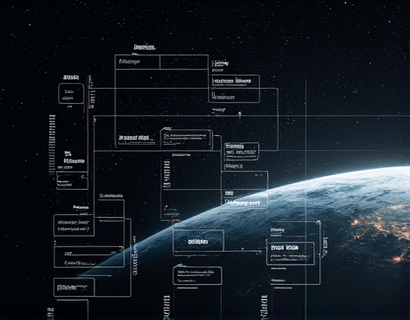Maximizing Civic Engagement: Harnessing the Power of Real-Time Data for Transparent Governance
In the digital age, the intersection of technology and governance has opened new avenues for civic engagement. Real-time data access stands as a pivotal element in this transformation, offering unprecedented opportunities for transparent governance. This article delves into the transformative impact of real-time data on governance, exploring how open data initiatives drive informed citizen participation and enhance accountability in democratic processes. By providing a platform for transparent government information, these initiatives empower citizens to engage more deeply in the democratic process, fostering a collaborative and accountable government.
The concept of open data in governance is not new, but its implementation through real-time data streams represents a significant leap forward. Real-time data refers to information that is collected, processed, and made available to the public as it happens, offering immediacy and relevance. This immediacy is crucial for several reasons. First, it ensures that citizens have access to the most current information, which is essential for making informed decisions. Second, it allows for rapid response and adaptation, enabling both government and citizens to react swiftly to emerging issues and trends.
One of the most significant benefits of real-time government data is its role in enhancing transparency. Transparency is the cornerstone of accountable governance, and real-time data provides a powerful tool to achieve this. When government operations, budgets, and decision-making processes are made accessible in real time, citizens can scrutinize and understand how their government functions. This level of transparency breaks down the traditional barriers between the government and the governed, fostering a more open and trusting relationship.
Real-time data also plays a crucial role in promoting informed citizen participation. Informed participation means that citizens are not just passive recipients of information but active contributors to the democratic process. With real-time data, citizens can stay updated on policy developments, budget allocations, and other critical government activities. This continuous flow of information enables citizens to engage in meaningful discussions, provide feedback, and even propose solutions to public issues. The immediacy of real-time data ensures that these discussions are based on the latest information, making them more relevant and impactful.
Moreover, real-time data facilitates greater accountability. When government actions and decisions are transparent and accessible, it becomes easier to hold officials accountable for their actions. Citizens can monitor the implementation of policies, track the use of public funds, and identify areas where improvements are needed. This accountability is essential for building trust in government institutions and ensuring that they operate in the best interest of the public.
The implementation of real-time data in governance is not without its challenges. One of the primary challenges is the technical infrastructure required to collect, process, and disseminate data in real time. Governments need robust IT systems capable of handling large volumes of data and ensuring its accuracy and reliability. Additionally, there is a need for standardized data formats and protocols to facilitate interoperability and ease of access for citizens and other stakeholders.
Another challenge is ensuring data privacy and security. Real-time data often includes sensitive information, and protecting this data from unauthorized access and misuse is paramount. Governments must implement stringent security measures and adhere to privacy regulations to maintain public trust. Transparency in data handling practices and clear communication about data usage can help alleviate concerns and foster confidence in the system.
Despite these challenges, the benefits of real-time data in governance are undeniable. A prime example of successful implementation can be seen in various smart city initiatives around the world. These initiatives leverage real-time data to improve urban management, enhance public services, and increase citizen engagement. For instance, real-time traffic data can help city planners optimize traffic flow, reduce congestion, and improve public transportation systems. Similarly, real-time environmental data can inform citizens about air quality, water quality, and other environmental factors, enabling them to take proactive steps to protect their health and the environment.
Real-time data also revolutionizes the way governments interact with citizens. Traditional methods of communication, such as annual reports and periodic updates, are often too delayed to be useful. Real-time data breaks this mold by providing continuous updates and interactive platforms for citizen engagement. Online portals, mobile apps, and social media channels serve as vital platforms for disseminating real-time data and facilitating two-way communication between the government and the public.
One notable example of real-time data enhancing civic engagement is the use of open data portals. These portals provide a centralized location where citizens can access a wide range of government data, from budget expenditures to public health statistics. By making this data easily accessible and usable, open data portals empower citizens to analyze and interpret the information, leading to more informed and engaged communities. For instance, citizens can track the progress of public projects, monitor the performance of local services, and identify areas where government intervention is needed.
Furthermore, real-time data supports participatory governance models, where citizens are actively involved in decision-making processes. Through real-time feedback mechanisms, citizens can provide input on policy proposals, suggest improvements, and collaborate with government officials. This collaborative approach not only enriches the decision-making process but also ensures that policies are more aligned with the needs and preferences of the community.
The impact of real-time data on civic engagement extends beyond individual citizens to civil society organizations and advocacy groups. These groups can leverage real-time data to monitor government actions, advocate for policy changes, and mobilize public support. Real-time data provides them with the tools to conduct real-time analysis, generate evidence-based reports, and engage in strategic advocacy. This empowerment of civil society is crucial for a healthy democracy, as it ensures that diverse voices are heard and considered in the governance process.
To fully harness the potential of real-time data for transparent governance, several strategic steps can be taken. First, governments should invest in building the necessary technological infrastructure to support real-time data collection and dissemination. This includes upgrading IT systems, adopting open data standards, and ensuring robust data management practices. Second, there should be a focus on user-friendly interfaces and accessible formats to ensure that real-time data is usable by a broad audience, including those with limited technical expertise.
Third, fostering a culture of transparency and accountability within government institutions is essential. This involves training government employees on the importance of open data, implementing transparent data handling policies, and establishing mechanisms for public feedback and oversight. Public awareness campaigns can also play a vital role in educating citizens about the availability and utility of real-time government data, encouraging their active participation in the democratic process.
In conclusion, real-time data access is a transformative force in governance, driving informed citizen participation and enhancing accountability. By providing a platform for transparent government information, real-time data empowers citizens to engage more deeply in the democratic process, fostering a collaborative and accountable government. As more governments embrace open data initiatives, we move closer to a future where governance is not only transparent but also participatory and responsive to the needs of the people.










































